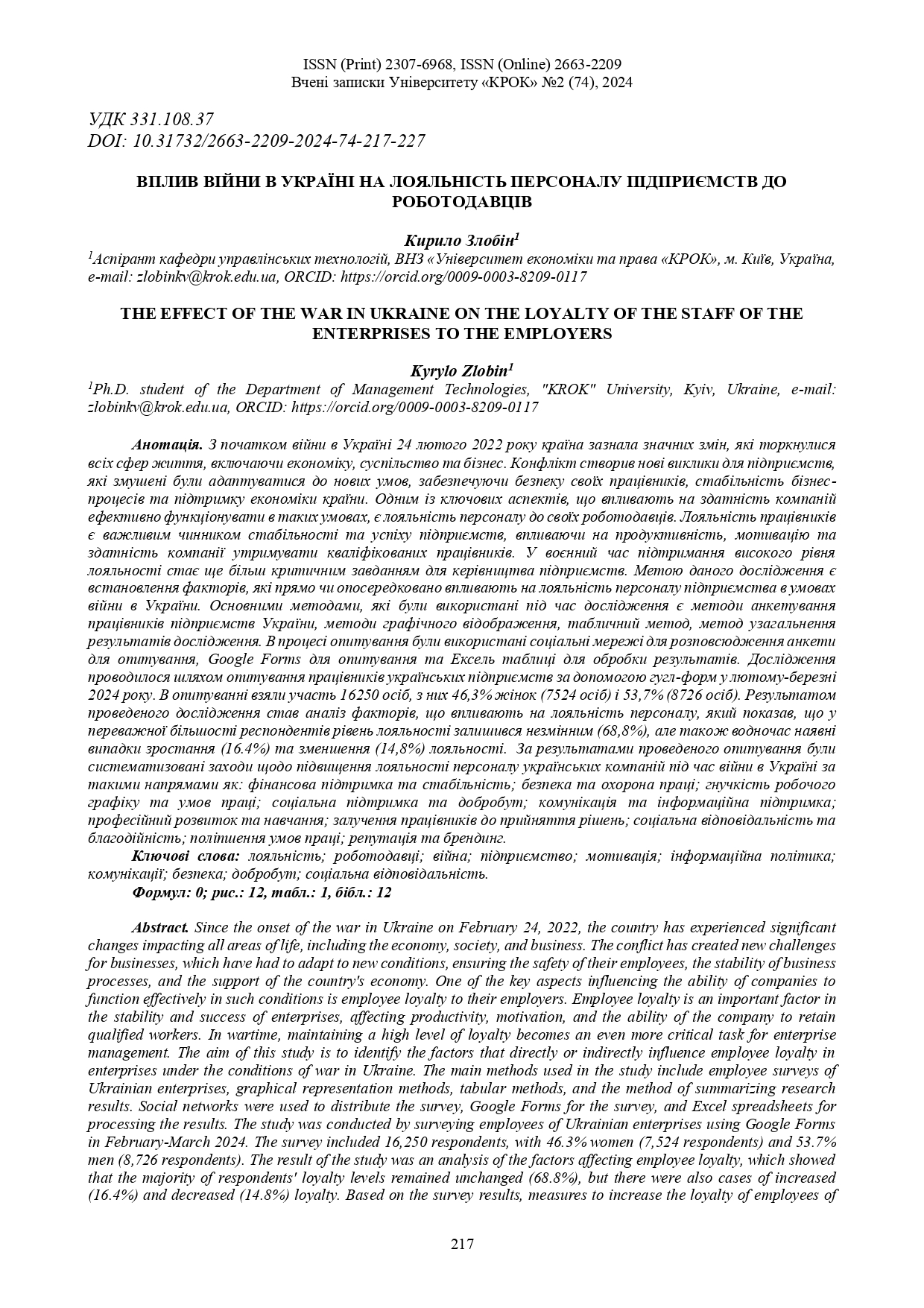THE EFFECT OF THE WAR IN UKRAINE ON THE LOYALTY OF THE STAFF OF THE ENTERPRISES TO THE EMPLOYERS
DOI:
https://doi.org/10.31732/2663-2209-2024-74-217-227Keywords:
loyalty, employers, war, enterprise, motivation, information policy, communications, security, well-being, social responsibilityAbstract
Since the onset of the war in Ukraine on February 24, 2022, the country has experienced significant changes impacting all areas of life, including the economy, society, and business. The conflict has created new challenges for businesses, which have had to adapt to new conditions, ensuring the safety of their employees, the stability of business processes, and the support of the country's economy. One of the key aspects influencing the ability of companies to function effectively in such conditions is employee loyalty to their employers. Employee loyalty is an important factor in the stability and success of enterprises, affecting productivity, motivation, and the ability of the company to retain qualified workers. In wartime, maintaining a high level of loyalty becomes an even more critical task for enterprise management. The aim of this study is to identify the factors that directly or indirectly influence employee loyalty in enterprises under the conditions of war in Ukraine. The main methods used in the study include employee surveys of Ukrainian enterprises, graphical representation methods, tabular methods, and the method of summarizing research results. Social networks were used to distribute the survey, Google Forms for the survey, and Excel spreadsheets for processing the results. The study was conducted by surveying employees of Ukrainian enterprises using Google Forms in February-March 2024. The survey included 16,250 respondents, with 46.3% women (7,524 respondents) and 53.7% men (8,726 respondents). The result of the study was an analysis of the factors affecting employee loyalty, which showed that the majority of respondents' loyalty levels remained unchanged (68.8%), but there were also cases of increased (16.4%) and decreased (14.8%) loyalty. Based on the survey results, measures to increase the loyalty of employees of Ukrainian companies during the war in Ukraine were systematized in areas such as financial support and stability; safety and labor protection; flexible working hours and conditions; social support and well-being; communication and informational support; professional development and training; employee involvement in decision-making; social responsibility and charity; improvement of working conditions; and reputation and branding.
Downloads
References
Bondarouk, T., & Ruël, H. (2009). Electronic human resource management: challenges in the digital era. International Journal of Human Resource Management, 20(3), 505-514.
Dabirian, A., Kietzmann, J., & Diba, H. (2017). A great place to work!? Understanding crowdsourced employer branding. Business Horizons, 60(2), 197-205.
Fan, W., & Yan, Z. (2010). Factors affecting response rates of the web survey: A systematic review. Computers in Human Behavior, 26(2), 132-139.
Gill, P., Stewart, K., Treasure, E., & Chadwick, B. (2008). Methods of data collection in qualitative research: interviews and focus groups. British Dental Journal, 204(6), 291-295.
Holtom, B. C., Mitchell, T. R., Lee, T. W., & Eberly, M. B. (2008). Turnover and retention research: A glance at the past, a closer review of the present, and a venture into the future. Academy of Management Annals, 2(1), 231-274.
Jackson, M. C., Mansingh, G., & McAuley, J. (2001). Information technology and knowledge management. Handbook on Knowledge Management, 1, 517-531.
Kaplan, A. M., & Haenlein, M. (2010). Users of the world, unite! The challenges and opportunities of Social Media. Business Horizons, 53(1), 59-68.
Kuvaas, B. (2016). Performance appraisal satisfaction and employee outcomes: Mediating and moderating roles of work motivation. International Journal of Human Resource Management, 27(1), 36-53.
Men, L. R. (2014). Strategic internal communication: Transformational leadership, communication channels, and employee satisfaction. Management Communication Quarterly, 28(2), 264-284.
Мігус І. П. (2012). Кадрова безпека суб'єктів господарської діяльності: менеджмент інсайдерами : монографія / за заг. ред. проф. Мігус І. П. Черкаси: «МАКЛАУТ». 315 с.
Мігус, І. П. (2018). Створення системи управління кадровою безпекою на підприємстві. Вчені записки Університету «КРОК», (4 (52), 213–221. https://doi.org/10.31732/2663-2209-2018-52-213-221
Мігус, І. П., & Черненко, С. А. (2013). Оцінка лояльності персоналу в контексті забезпечення економічної безпеки підприємства. Агросвіт, (11), 24-27.

Downloads
Published
How to Cite
Issue
Section
License

This work is licensed under a Creative Commons Attribution-NonCommercial 4.0 International License.

